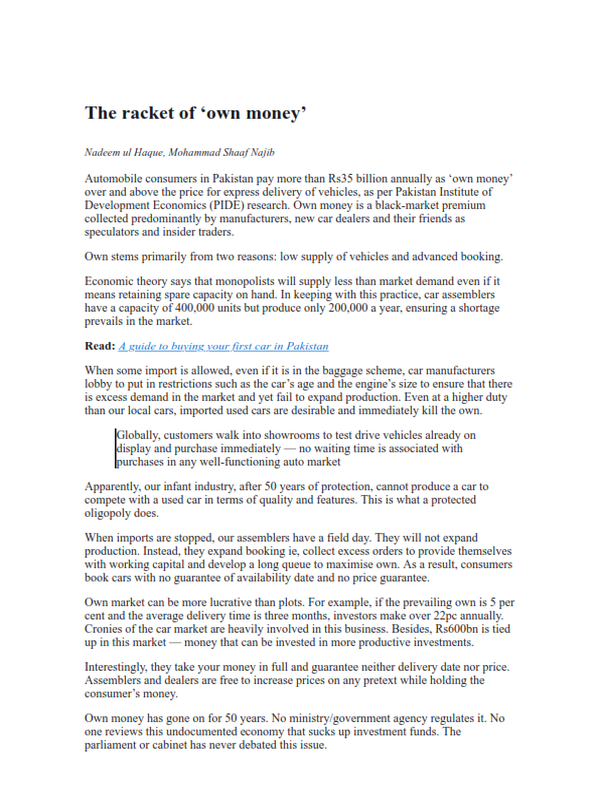The racket of ‘own money’
Automobile consumers in Pakistan pay more than Rs35 billion annually as ‘own money’ over and above the price for express delivery of vehicles, as per Pakistan Institute of Development Economics (PIDE) research. Own money is a black-market premium collected predominantly by manufacturers, new car dealers and their friends as speculators and insider traders.
Own stems primarily from two reasons: low supply of vehicles and advanced booking.
Economic theory says that monopolists will supply less than market demand even if it means retaining spare capacity on hand. In keeping with this practice, car assemblers have a capacity of 400,000 units but produce only 200,000 a year, ensuring a shortage prevails in the market.
When some import is allowed, even if it is in the baggage scheme, car manufacturers lobby to put in restrictions such as the car’s age and the engine’s size to ensure that there is excess demand in the market and yet fail to expand production. Even at a higher duty than our local cars, imported used cars are desirable and immediately kill the own.
Globally, customers walk into showrooms to test drive vehicles already on display and purchase immediately — no waiting time is associated with purchases in any well-functioning auto market
Apparently, our infant industry, after 50 years of protection, cannot produce a car to compete with a used car in terms of quality and features. This is what a protected oligopoly does.
When imports are stopped, our assemblers have a field day. They will not expand production. Instead, they expand booking ie, collect excess orders to provide themselves with working capital and develop a long queue to maximise own. As a result, consumers book cars with no guarantee of availability date and no price guarantee.
Own market can be more lucrative than plots. For example, if the prevailing own is 5 per cent and the average delivery time is three months, investors make over 22pc annually. Cronies of the car market are heavily involved in this business. Besides, Rs600bn is tied up in this market — money that can be invested in more productive investments.
Interestingly, they take your money in full and guarantee neither delivery date nor price. Assemblers and dealers are free to increase prices on any pretext while holding the consumer’s money.
Own money has gone on for 50 years. No ministry/government agency regulates it. No one reviews this undocumented economy that sucks up investment funds. The parliament or cabinet has never debated this issue.
The consumers have no voice in this system.
What can be done to make a car market and move away from a car black market that prevails?
- Advanced booking must have some rules generally applied to contracts. First, delivery time limits should be imposed of no more than a month at the cost of penalties. Secondly, the price at the time of booking must be considered the final price.
- Assemblers must operate at a minimum of 80pc capacity to ensure that periods of excess demand do not last for more than four weeks. The size of the own can easily measure this.
- While disallowing companies to collect advances for bookings of vehicles, the dealers must also not be permitted to commit to the sale of any vehicle that is not available at their dealership. The dealers are the main players and stakeholders in the collection of own money premium and must be dealt with accordingly per the law to curb this exploitation of the consumers.
Globally, customers walk into showrooms to view and test drive vehicles already on display and purchase immediately if they desire. No waiting time for the assembly of the vehicle is associated with automobile purchases in any well-functioning automobile market.
Ultimately it is government policy that has been hostage to assemblers for the last 50 years. An automobile market has not been created because of flawed government policy that seeks the impossible goal of local car manufacturing under heavy protection. Assemblers have no incentive to export or develop a normal car industry when they have a captive market.
It is time we understood that protection ruins kids. Every kid must be allowed to compete in school free of parental protection. Likewise, the government has been told many times that all markets require openness on the import and export sides. Yet the assemblers end up having their way of claiming own.
The government must allow imports selectively. Tariff differential between imported and assembled cars already gives an edge to local assemblers. Besides, imports generate tariff revenue and not a substantial decrease in foreign exchange, as the difference in the cost of assembly kits and the price of a new car is not significant.
There has been inertia in the car industry for the last 20 governments. It seems that there is no analytical capacity to analyse this complex problem anywhere in the government. Yet consumers are being taxed heavily. At the minimum, this tax on consumers — the own premium on poor-quality cars — should be added to the tax calculation to show that our tax-to-GDP ratio is not as bad as they say.
Nadeem ul Haque is Vice Chancellor at PIDE. He tweets @nadeemhaque.
Mohammad Shaaf Najib is Research Fellow at PIDE. He tweets @MShaafNajib14
Published in Dawn, The Business and Finance Weekly, October 3rd, 2022




